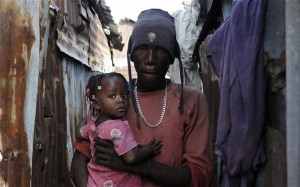We are a society that has chosen to embrace a vision of America where there are no ghettos, poverty or slums. We are a country that has chosen to burden all citizens with laws, regulations and taxes to fund programs that avoid shanty towns that are common to some of our neighbors. We are a nation that understands that while we all have inalienable rights, not all of us are created equal.
It is a myth to suggest that an economic system devoid of regulations and taxes will create real opportunities that will lift everyone out of poverty.
Not all are equal
Here is the hard cold fact that some folks don’t want to acknowledge: not everyone has the mental ability to rise to a CEO, engineer or successful small business owner. There is a permanent segment within all populations who’s highest and best contribution is unskilled or semi-skilled positions.
High income earners push up prices
Because we have such income disparities in the U.S., those who have money bid up the price of basic commodities that all of use. This puts those on the bottom of the wage earning ladder at a relative disadvantage to maintain a healthy standard of living. As such, there will always be a small percentage of citizens that will need government assistance, even if they have a full time job, just to remain out of abject
poverty.
Sustainable and productive is the end goal
I understand the political ideology that without all the government regulations each individual has the opportunity to become as wealthy as the CEO on Wall Street. I am sorry to bust the bubble, but for some folks no amount of education or training will ever make them a millionaire. Their hope, and our goal, should be a variety of jobs that maximize their skill set and resources in order to create a sustainable and productive life. Until most of America comes to grips with this social and economic reality, we will continue to argue over the theory that entitlement programs keep people in poverty.
Programs prevent poverty and slums
We must acknowledge that some folks perpetually live on the edge because of circumstances beyond their control. Without certain government programs like AFDC, Medicaid, Food stamps, School Lunch program and Section 8 rental assistance many families would be torn apart by debt just trying to secure the fundamentals of everyday American existence. Even with these programs, many families are living out of motels and cars.
Leveling the labor income field
Without certain government regulations such as minimum wage, workers’ compensation insurance and unemployment taxes, there are many families that would slide into dire poverty and be forced to reside in shanty towns. The United States is fortunate not to have the slums of Haiti, Mexico, Brazil, or India because we have chosen government programs and regulations that are designed to prevent such living conditions. If we were to strip many of these labor protections away, we would see increasing poverty among America’s labor pool.
Not all opportunities are equal
Virtually everyone in the United States is presented with opportunities to improve their income. Some have the education, knowledge and experience to capitalize on those opportunities. Others either fail or are not interested. Regardless of how a person of family slipped into an economically disadvantaged situation, we must stay true to the vision to support those people until they can attain an economic reality that is sustainable and productive.
